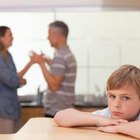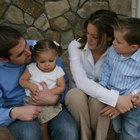
Divorce comes with a host of raw emotions. For a mother, separating her family can lead to feelings of guilt. These feelings are normal during the trauma of divorce, but must be handled appropriately. A mother cannot let guilt run her life or filter down to her child. She must stay level-headed and remember to keep personal feelings about the father away from their child. If counseling is necessary to help process emotions, she should seek help immediately.
Examine the Relationship
A couple's separation is traumatic. During separation, a woman leaving the father of her children experiences guilt, fear, relief and resentment, according to the article "Psychological and Emotional Aspects of Divorce," on Mediate.com. The breakdown of a marriage happens over months and years, not overnight. In order to move past guilt, examine the relationship. Time, self-healing and space offer perspective and alleviate guilt.
Don't Worry
Avoid obsessing over guilt. You can always find reason to feel guilty: the time the children will not spend with their father, the lost relationship, the financial change the family may endure, according to "Coping With Guilt as a Single Parent," by Cynthia Yates, author of the book, "Living Well as a Single Mom: A Practical Guide to Managing Your Money, Your Kids and Your Personal Life." Don't dwell upon guilt or internalize it into a negative inner dialogue. Relationships end for a reason and eventually everyone heals and moves forward.
Set the Standard
A mother's guilt over the loss of the family unit can have a lasting effect on her child. Children move forward if they know their parents have resolved feelings regarding the divorce, according to "Children and Separation," a Family Relationships Online article. When parents move on, so will the children. Counseling may be necessary if the mother cannot move forward.
The Blame Game
Guilt is sometimes accompanied by fear and anger. No matter how angry a mother becomes, she should resist the temptation to bad mouth the child's father. The breakdown of the parental relationship does not change the fact that he is the child's father. A child should be kept out of arguments between adults, advises the article, "Helping Children When Parents Separate," by The Child Center and Adult Services, Inc. When parents bad mouth one another, children become resentful toward them.
Related Articles

Lasting Effects on Adult Children of ...

Effects of Divorce on Children in ...

The Advantages & Disadvantages of a ...

An Abusive Father and the Effects on a ...

Psychological Effects of Fatherlessness

What Is a Caregiver's Authorization ...

The Emotional Effects on the Father ...

How to Deal With an Adult Daughter's ...

How to Legally Change a Child's Last ...

The Effects of an Absent Mother Figure

How Adult Children React to a Parent's ...

California CPS Laws

General Characteristics of Emotionally ...

The Effects of Divorce on Women

The Effects of Divorce & Introducing a ...

Behavior Children Will Show After Being ...

Laws About Leaving a Child Home Alone ...

Explaining Divorce to Young ...

The Boundaries of a New Relationship ...

Consequences of Absent & Neglectful ...
References
Resources
Writer Bio
Jaime Vargas-Benitez has been a parenting writer since 2010. She has worked in the child wellness field in various roles for over 20 years. Along with the experiences of raising her own kids, she has been privileged enough to participate in the raising of hundreds of other children as well.
Photo Credits
Photos.com/Photos.com/Getty Images